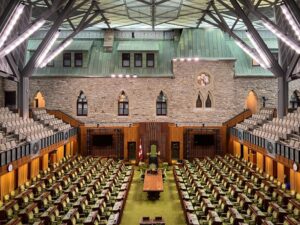House of Commons, summer break unanimous decision: the “interferences” can wait
TORONTO – It’s summer time: the call of barbecues (or, for the lucky ones, Caribbean beaches) is too strong and even “Chinese interference” can wait. Thus, on Wednesday, as if nothing had happened, all the parties (including those of the opposition, “hard and pure” until the day before yesterday) agreed to close the doors of the House of Commons starting next Wednesday: we’ll talk about it again in September.
It is true that in these hours the meetings for the opening of a public inquiry (requested on several occasions by the Conservatives, NDP and Bloc Quebecois and so far always denied by the Liberals) continue and it is not excluded that an agreement could still be announced within the end of this week. But it seems unlikely, given the distance between the government led by Justin Trudeau and the rest of the House of Commons.
As well known, the case of “Chinese interference” has exploded in recent months: the Beijing government allegedly, in a nutshell, attempted to influence the results of the Canadian federal elections of 2019 and 2021, targeting some parliamentarians of deemed hostile to China’s interests. Then, in May, Canada expelled a Chinese diplomat believed to be responsible for some of these attacks. The Liberals, however, resisted repeated calls for a public inquiry and instead appointed former Governor-General David Johnston as special rapporteur to give “advice” on the matter and decide whether an inquiry was warranted. And he, in his final report, advised against an investigation, arousing the ire of opposition parties who accused him of being a personal friend of Trudeau and too close to the liberals, asking for (and obtaining) his resignation.
At that point, a sort of “ballet” of the oppositions began: Yves-François Leblanc (Bloc Quebecois) said he was ready to name names to replace the outgoing special rapporteur and kick off the public inquiry; Jagmeet Singh (NDP) said he was “little confident of the timing” of an agreement on a public inquiry, but said he saw greater openness from the federal government in convening one, while promising “not to ease pressure” on the government itself which, however, the NDP itself is supporting, guaranteeing its survival; Pierre Poilievre (Conservatives) refused to name names for the choice of a possible replacement for the special rapporteur, stating that his party will only suggest someone after the government announces the opening of a public inquiry.
For his part, the Prime Minister said he was “diffident”, given “how the opposition parties have behaved in recent months” towards Johnston. “We want to make sure everyone is on board and we don’t want to fall back on personal attacks that would undermine Canadians’ trust in their institutions” Trudeau said. Trust, which, in reality is already at a minimum. Indeed, if on the one hand everyone agrees that the results of the 2019 and 2021 federal elections have not been compromised, on the other hand opposition MPs say that a public inquiry into foreign interference attempts is the only way to Canadians to regain some faith in Canada’s electoral system.
A concern which, however, seems shared only in words by all the parties present in the House of Commons, for whom the lure of the scent of sausages and frankfurters roasted on the barbecue in the garden behind their house seems stronger than the need to ensure that the federal elections take place without the interference of foreign countries hostile to Canada.




